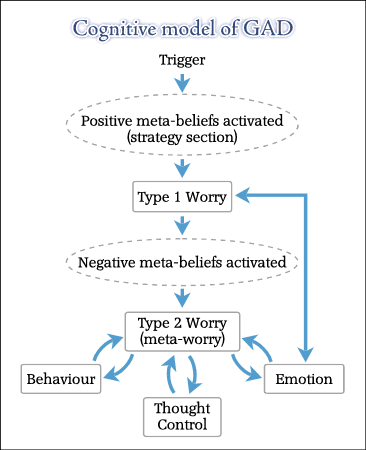
Tel: 0800 078 7712
Home | Common Problems | Therapies | Therapy Format | Common Myths | Consultancy | Contact | Links
Expert; Individual; Formulation driven CBT
Copyright © 2022, A.S.T. Consultancy.
Generalised Anxiety Disorder
ICD10 Diagnostic Criteria:
- The essential feature of Generalised Anxiety Disorder (GAD) is anxiety.
- It is generalised and persistent.
- GAD is not restricted to, or even strongly predominating in, any particular environmental
circumstances.
- As with the other anxiety disorders the dominant features are highly variable.
- The sufferer must have primary symptoms of anxiety most days for at least several
weeks at a time, and usually for several months.
- These symptoms should usually involve elements of:
– Apprehension
– Motor tension
– Autonomic over-
The expression of Generalised Anxiety Disorder appears to differ from that of obsessions and negative automatic thoughts, in that two conflicting beliefs are held concerning the nature of worry.
The impression, that worry is a problem solving strategy conflicts with the idea that worry will also have some sort of catastrophic consequence. The worry is distressing and generally believed to be uncontrollable.
Worry can be triggered intentionally, by situation or from a single intrusive
thought, and periods of chronic or repeated worrying, which cause feelings of anxiety or apprehension, on a variety of topics are commonly reported by those whom suffer with GAD. These episodes range from a pervasive sense of being worried to discrete episodes of rumination lasting from minutes to hours.
Worry may be marked at initial presentation; however problematic worry is a key feature of GAD.
Formulation
The Cognitive Behavioural Therapist will work with the sufferer to discover the maintaining factors of the presenting problem and collaboratively construct an idiosyncratic formulation of this problem.
Following this an individual treatment regimen will be constructed which will be guided by the formulation.
Treatment
The treatment approach will include education into the nature of GAD, strategies to minimise avoidance and reassurance seeking behaviours, thought control and other unhelpful behaviours. Cognitive interventions include verbal reattribution, behavioural experimentation, challenging beliefs regarding the uncontrollability and inevitability of worry and the modification of cognitive biases.

Cognitive model of generalised anxiety disorder: Adrian Wells; 1997
NHS figures for 2007 suggest that one in 50 of the UK population are affected by Generalised Anxiety Disorder (GAD), which is a persistent and irrational worry about everyday things.
